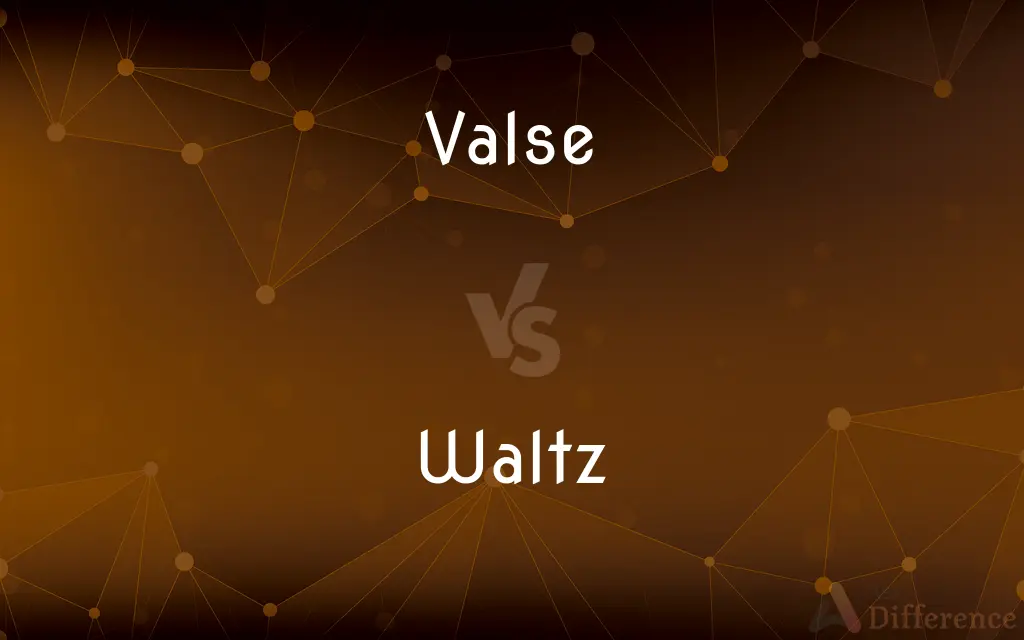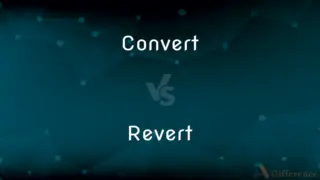Valse vs. Waltz — What's the Difference?
Edited by Tayyaba Rehman — By Urooj Arif — Updated on April 7, 2024
Valse and Waltz refer to the same dance style, but "valse" is used in French-speaking contexts, while "waltz" is the English term.

Difference Between Valse and Waltz
Table of Contents
ADVERTISEMENT
Key Differences
Valse, the French term for waltz, is a ballroom and folk dance in triple meter, traditionally performed in a closed position. It originated in the 18th century, reflecting elegance and fluidity in its movements. On the other hand, the English term "waltz" describes the same dance, emphasizing its 3/4 time signature and graceful, flowing movements. Both terms point to a dance that has evolved over time, gaining popularity across Europe and subsequently worldwide.
The term "valse" is often associated with the sophisticated ambiance of French ballrooms and salons, where it was danced to the music of composers like Chopin and Ravel. Waltz, however, evokes the broader European tradition, with famous pieces by Strauss and Tchaikovsky capturing the dance's romantic essence. Despite these cultural nuances, the core elements of the dance remain consistent across both terms.
In musical compositions, "valse" is typically used to denote pieces intended for the dance, with an emphasis on romantic or impressionistic styles, particularly in French music. The waltz, while also referring to music in 3/4 time, is more widely recognized in classical and folk music traditions beyond France, showcasing a variety of emotional tones and contexts.
The valse was seen as a daring and innovative dance in French society, challenging traditional notions of decorum with its close embrace. Similarly, the waltz faced initial resistance in English-speaking countries for its perceived impropriety. Over time, both versions of the dance became accepted and celebrated for their beauty and expressiveness.
Despite their shared origins and characteristics, the valse and waltz continue to be distinguished by their linguistic and cultural associations. The valse is deeply embedded in the French cultural heritage, while the waltz is celebrated in a broader, international context, often associated with the grand balls of Vienna and the romantic era of classical music.
ADVERTISEMENT
Comparison Chart
Term Origin
French
English
Cultural Context
Associated with French elegance and sophistication
Broadly European, with a strong association to Vienna
Musical Compositions
Often romantic or impressionistic
Includes a wide range of emotional tones, from romantic to melancholic
Historical Reception
Initially seen as daring and innovative in French society
Met with resistance for its closeness, later celebrated internationally
Typical Music Composers
Chopin, Ravel
Strauss, Tchaikovsky
Compare with Definitions
Valse
Characterized by romantic and impressionistic compositions.
Chopin's waltzes are performed with a depth of emotion that epitomizes the valse.
Waltz
Expanded beyond its roots to become a staple in ballroom competitions and social dancing.
Competitive ballroom waltz emphasizes precision, fluidity, and the beauty of the dance's form.
Valse
Initially challenged societal norms with its close embrace.
The introduction of the valse was revolutionary, breaking away from the more formal dance styles of the time.
Waltz
Encompasses a broad spectrum from classical to folk, with a focus on the 3/4 time signature.
Strauss's Blue Danube is synonymous with the waltz, celebrated for its joyful melody.
Valse
A ballroom and folk dance in triple meter, known for its elegance and fluid movements, predominantly in French-speaking contexts.
The valse remains a favorite in French ballrooms for its graceful and sophisticated style.
Waltz
Overcame initial skepticism to become a beloved dance across cultures.
Despite its controversial beginnings, the waltz is now revered as a classic form of ballroom dance.
Valse
Has evolved to include faster and more complex variations.
Modern interpretations of the valse can include intricate footwork and dynamic turns.
Waltz
A dance in 3/4 time signature, known for its smooth, flowing movements and strong musical rhythm, recognized worldwide.
The waltz captivates with its rhythmic rise and fall, embodying the romance of dance.
Valse
Reflects the sophistication of French social dances of the 19th century.
The valse is often associated with the refined atmosphere of Parisian salons.
Waltz
Became a symbol of the romantic era in music and dance, with a strong presence in Vienna.
Vienna's ballrooms became the epicenter of the waltz, hosting grand balls that showcased the dance's elegance.
Valse
Archaic form of waltz
Waltz
The music for this dance.
Valse
Archaic form of waltz
Waltz
The waltz (from German Walzer [ˈvalt͡sɐ̯]), meaning "to roll or revolve", is a ballroom and folk dance, normally in triple time, performed primarily in closed position.
Valse
A ballroom dance in triple time with a strong accent on the first beat
Waltz
A ballroom dance in triple time with a strong accent on the first beat.
Waltz
An instrumental or vocal composition in triple time.
Waltz
(Informal) Something that presents no difficulties and can be accomplished with little effort.
Waltz
To dance the waltz.
Waltz
(Informal) To move with self-assuredness or indifference
Always waltzes into the office 30 minutes late.
Waltz
(Informal) To accomplish a task, chore, or assignment with little effort
Waltzed through the exams.
Waltz
To dance the waltz with.
Waltz
(Informal) To lead or force to move in a self-assured or purposeful manner; march
Waltzed them into the principal's office.
Waltz
A ballroom dance in 3/4 time.
Waltz
A piece of music for this dance (or in triple time).
Waltz
(informal) A simple task.
Waltz
To dance the waltz (with).
They waltzed for twenty-one hours and seventeen minutes straight, setting a record.
While waltzing her around the room, he stepped on her toes only once.
Waltz
To move briskly and unhesitatingly, especially in an inappropriately casual manner, or when unannounced or uninvited.
He waltzed into the room like he owned the place.
You can't just waltz him in here without documentation!
Waltz
(informal) To accomplish a task with little effort.
Don't worry about the interview — you'll waltz it.
Waltz
(transitive) To move with fanfare.
Waltz
A dance performed by two persons in circular figures with a whirling motion; also, a piece of music composed in triple measure for this kind of dance.
Waltz
To dance a waltz.
Waltz
An assured victory (especially in an election)
Waltz
Music composed in triple time for waltzing
Waltz
A ballroom dance in triple time with a strong accent on the first beat
Waltz
Dance a waltz
Common Curiosities
How have composers contributed to the popularity of the valse/waltz?
Composers like Strauss and Chopin wrote music that highlighted the dance's elegance and emotional depth, contributing to its popularity.
Can the terms valse and waltz be used interchangeably?
While technically referring to the same dance, their usage often depends on cultural or linguistic context.
What makes the waltz unique in the world of dance?
Its 3/4 time signature, fluid movements, and the emotional range it can express make it unique.
What role does the valse play in French culture?
It is a part of France's cultural heritage, reflecting the country's history of sophistication in dance and music.
Are there different types of waltzes?
Yes, including the Viennese waltz, which is faster, and the slower American and English waltzes.
What impact did the waltz have on other forms of dance?
It influenced the development of other ballroom dances and the broader acceptance of partner dancing.
What is the main difference between valse and waltz?
The main difference is linguistic: "valse" is French, while "waltz" is the English term for the same dance style.
How is the valse/waltz taught today?
It is a fundamental part of ballroom dance curricula worldwide, emphasizing grace, posture, and fluid motion.
Can the valse be considered a part of classical music?
Yes, many valse pieces are staples in the classical music repertoire, particularly those by French composers.
Why was the waltz considered controversial?
Its close hold and the intimate proximity of the dancers were seen as scandalous compared to the more formal dances of the time.
How has the social perception of the waltz changed over time?
It evolved from being considered improper to being celebrated as a symbol of romance and elegance.
Is there a difference in technique between valse and waltz?
No, the technique is essentially the same, though stylistic interpretations can vary by region.
What is the significance of the 3/4 time signature in a waltz?
It gives the dance its characteristic rhythmic pattern and flowing movement.
What are the key elements of a valse or waltz performance?
Key elements include maintaining the 3/4 rhythm, the closed dance position, and conveying the dance's romantic essence.
How does the cultural context influence the performance of a valse or waltz?
Performances can vary, reflecting regional musical styles, dance techniques, and cultural nuances.
Share Your Discovery

Previous Comparison
Convert vs. Revert
Next Comparison
Jinn vs. OniAuthor Spotlight
Written by
Urooj ArifUrooj is a skilled content writer at Ask Difference, known for her exceptional ability to simplify complex topics into engaging and informative content. With a passion for research and a flair for clear, concise writing, she consistently delivers articles that resonate with our diverse audience.
Edited by
Tayyaba RehmanTayyaba Rehman is a distinguished writer, currently serving as a primary contributor to askdifference.com. As a researcher in semantics and etymology, Tayyaba's passion for the complexity of languages and their distinctions has found a perfect home on the platform. Tayyaba delves into the intricacies of language, distinguishing between commonly confused words and phrases, thereby providing clarity for readers worldwide.













































